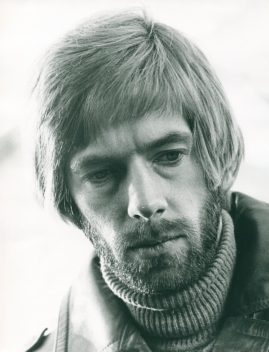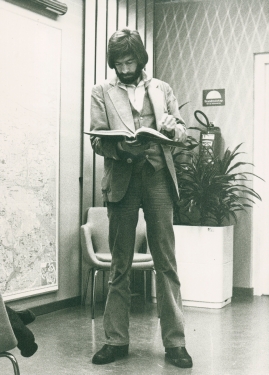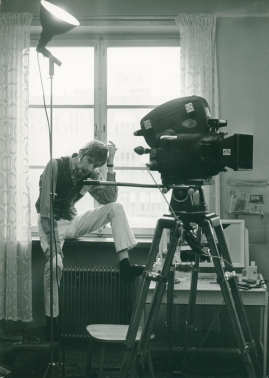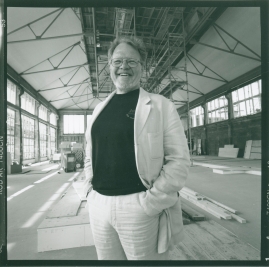Jan Halldoff
Table of contents
- Basic facts
- Links and resources
- Biography
- Awards
- Films
- Original work
- Soundtrack listing
- Groups
Basic facts
Media (3)
| Alternative names |
|
|---|---|
| Director |
|
| Screenplay |
|
| Show all films | |
| Awards |
|
Biography
Swedish director. Born and died in Stockholm.-There is a recurring theme in most of Jan Halldoff's films: they are about young people, "the gang", friends who uncertain of their direction in life, getting older as Halldoff himself grew older. Groups of friends stay together into adulthood before relationships start to fall apart, as in Polare ('Buddies', 1976) and the trucker film Klippet ('The Windfall', 1982), Halldoff's last feature.Halldoff brought the present day into Swedish feature films in a way that was unusual in the...
Biography
Swedish director. Born and died in Stockholm.
-
There is a recurring theme in most of Jan Halldoff's films: they are about young people, "the gang", friends who uncertain of their direction in life, getting older as Halldoff himself grew older. Groups of friends stay together into adulthood before relationships start to fall apart, as in Polare ('Buddies', 1976) and the trucker film Klippet ('The Windfall', 1982), Halldoff's last feature.
Halldoff brought the present day into Swedish feature films in a way that was unusual in the 1960s. Ordinary people, neighbourhood friends. Sometimes he did so directly, as in using the same characters from previous films. Some of the friends turned up in film after film right to the end.
Earlier films such as Livet är stenkul ('Life's a Gas',1967) and the bittersweet love story Ola & Julia (1967) are redolent of the 1960s, a time when belief in the future was paramount. In these films there is a dream of freedom, another of Halldoff's themes, although portrayed in a darker way in En dröm om frihet ('A Dream of Freedom', 1969), the story of two former prison friends who make the same journey one more time. Although the carefree 1960s were to return in Jack (1977), based on Ulf Lundell's novel of the same name, even here it appears that the dream of freedom is in many ways a myth.
Jan Halldoff was politically aware, but when he turned to explicitly political subjects the results were less successful. His hospital film Korridoren ('The Corridor', 1968) was said to be about a crisis in healthcare, but is actually a film about a young doctor who, forced into the wrong career by his father, revolts against him logically enough by changing his job. And when Halldoff wanted to criticise the soullessness of the suburbs in Stenansiktet ('Stone Face', 1973), the result was virtually a parody. His film version of the socially critical stage play "Chez nous" (1978) was un-cinematic and stuck too closely to the play. And his portrayal of teenage prostitution in Lämna mig inte ensam ('Don't Leave Me Alone', 1980) is unresolved and feels psychologically shaky.
Halldoff also made a number of film comedies, of which Firmafesten ('The Office Party', 1972) and Bröllopet ('The Wedding', 1973) were less successful than his third in the same genre, Dog Days (Rötmånad, 1970), one of his best ever films. Anyone so minded can see this totally madcap story of the setting up of a brothel in the Swedish archipelago as a parody of the sex and pornography wave that flooded Swedish cinema at that time. Lars Forssell provided some witty dialogue and the whole film is relentless in its vitality.
In my view the artistic pinnacle of Halldoff's directing career is Det sista äventyret ('The Final Adventure', 1974), based on a novel by Per Gunnar Evander. It centres on a young high school teacher who is seduced by one of his pupils, Helfrid, then forced into an unwanted engagement by his dominant mother. When he finds out that Helfrid has been unfaithful he becomes violently jealous and gets fired from the school. His mental health gradually declines and he ends up in psychiatric care. Once again in this film we discern the dream of freedom. In an engaging way it draws us into the divide between the desire to be free and to have control at the same time - to the point at which everything falls apart.
Jan Halldoff came into Swedish film in the 1960s as a breath of fresh air. His output was as up and down as a rollercoaster, but the peaks still endure to this day.
Gunder Andersson (2011)
(translated by Derek Jones)
Awards
| The Guldbagge Award | Stockholm | 1976 | Best Director | ||
|---|---|---|---|---|---|
| Chaplin Magazine Award | Stockholm | 1974 | |||
| Prize | Stockholm | 1969 | (SF-stipendium; 2500 kr) |




